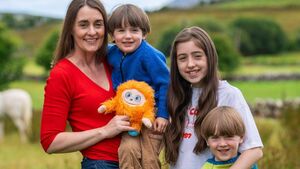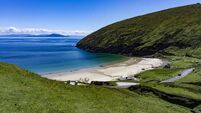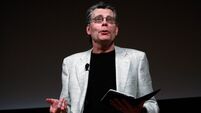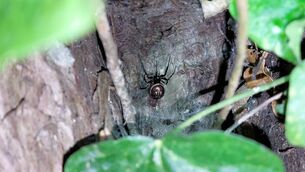Having a positive impact on children's lives

Stephanie Fitzgerald with her children Róisin, James and Conor.
Stephanie Fitzgerald has a deep passion for improving children’s social and emotional well-being.
The Westport native’s journey has seen her become a driving force in the field of educational psychology. Stephanie set up DESTY Island to help young people develop frameworks for their lives, to help them think about what they want to do, where they want to go, and how they're going to get there. DESTY Island has recently been nominated for a Global Education Award and Stephanie has a very clear idea of the heights she sees her venture eventually reaching.
We sat down to chat about what drives her and what her hopes are for the future.
Stephanie, tell me a little about your background.
I'm born and bred in Westport. I went to the local primary school, St Patrick's, and then to the Sacred Heart School. I went to third level at NUI Galway, to study Psychology through Arts in 1998. Then I spent four years in Galway and Clare getting experience. I knew I wanted to do psychology, and it was quite a challenge to get into any of the postgraduate courses because there were very limited spaces. I had wavered between Clinical and Educational Psychology. I really had my heart set on educational because I knew I wanted to work within schools and with young children.
What drew you to that Stephanie?
During transition year, I knew I couldn't study for my Leaving Certificate until I knew what I wanted to apply for. I have to say, my career guidance in the Sacred Heart School was very accommodating. She let me organise my own work experience, even when there wasn't a work experience programme in the school. I thought my path was teaching. I actually thought it might be journalism for a while.
Then I was directed from that onto speech therapy. I met an amazing woman called Collette McGinty, who's a speech therapist in the HSE, and she gave me her time. When she listened to me and listened to what I seemed to want, she put me on the path to psychology. Then I started digging into psychology and I thought, it's me. Then I was torn between psychology in Trinity College, which was a four-year degree, or Galway doing it through Arts, which was three years and where I'd have to compete for the place. I went for Galway knowing I'd have to compete with 200 others to get one of 20 spots in year two. I was very lucky to get that. It took me a few years then to get onto my postgrad but I was very driven then at that point, I knew I wanted to train as a psychologist.
What was the next step for you Stephanie?
NEPS is the National Educational Psychological Services and our Masters course was almost set up to be a channel for them to recruit, but I was the only one in my class that didn't apply to them. During my Masters, I realised that assessing children, labelling children and diagnosing children was not where I was at. I saw a massive gap in the social and emotional well-being of children.
When I was going into schools and meeting children, a lot of their learning issues were on the social and emotional parts of it, not having the confidence or there were other things, not just the fact that they were struggling academically. I had done some research with Trinity in their National Institute for Intellectual Disability. I travelled around the country with somebody else, interviewing young people with intellectual disabilities who were about to leave in the weeks ahead to go on, we didn't know where, and they didn't know where, and it was very stark.
What I learned was that nobody had conversations with them about what they wanted to do. That gave me this idea for developing a programme around helping young people to develop frameworks for their lives, to help them think about what they want to do, where they want to go, and how they're going to get there. I got onto a business programme in NovaUCD. It helped me to map that out a little bit.
Then I came home to Mayo a couple of years after that, and I was working out of the Innovation Centre at ATU for a short while at a hot desk there, and I did more research. The age group I was going in at, that teenage age, I was thinking around 15/16 years old but somebody said to me, that's too late, you're going to lose a lot of them, you need to start thinking earlier. It completely pivoted me in another direction, and I was decided then I needed to get at the younger children.
I started working on a programme around social and emotional intelligence, which was called DESTY Island and this was a software application. It was never intended to be, but the more I looked at it, the more I realised if we want to engage children and make it fun and whatever we do need to bring technology into it. The key piece for me was children need good role models and need skilled people to help them navigate through things, especially things like feelings.
Part of the programme is we train up key people in the children's life - primarily teachers and those working in education settings. We also train parents and foster carers, and then they get to use the curriculum, which is online and also workbook based. I have three children – aged eleven, five and three - they've all been on the island or finished it. Róisín did it when she was three, James has finished it at five and Conor, three, is doing it now. It's a programme I would love all children to do. It's valuable life skills, but unfortunately the time isn't available for every child to sit down with somebody to do it. But that's our flagship programme, so we've been pushing that out for the last few years and 90% of our work is in the UK.
Is there a particular reason for that Stephanie?
A couple of reasons. I embarked on a doctorate in the University of Limerick, which I didn't get to finish because of family and work commitments unfortunately, I got about halfway through. But I had an incredible supervisor there called Phil Stringer, and he was the Principal Education Psychologist in Hampshire.
Hampshire is considered one of the best sites in the UK in terms of local authorities. He saw what I was working on, and he encouraged me to do my research on that, and put me in contact with some of the people in the local authority in Hampshire. We ran a pilot in 2015 with 20 schools. That went incredibly well. From that we were able to make links with others.
Now, the primary organisations that we work with are organisations set up to monitor and track children in care - children in foster care or previously adopted, so they all have a specific fund to help them with individualised, targeted programmes. We fit into that pillar of social emotional wellbeing, and we have got an evidence-based programme, and we've got the data - we collect quantitative data, we've got qualitative data, so we tick an awful lot of their boxes. Plus it's individualised, it's attachment based, it's trauma informed, it's all the things that they are trying to target.
I did start in Ireland and I travelled around all the education centres, but I couldn't get any foothold in Ireland, and there were a couple of reasons for that. One is that schools in Ireland typically don't have their own budgets, so in the UK they get a budget, and they have some autonomy around it. In Ireland, we don't necessarily have that unless the Department comes on board.
Where we managed to find traction in Ireland is through what's called school completion programmes. This is now under the umbrella of Tusla. These are people who are either previous teachers or are therapists or a different variety roles, and their remit is to support children who are at risk of leaving school. They go into schools, and they've got the capacity to work individually with children. So we are in every county in Ireland now, which I am delighted about.
And you've been nominated recently for a huge award?
Yes, we've just been nominated for a Global Education Award. I was told by an Enterprise Ireland representative that this is the biggest conference in Dubai without doubt. I went to Dubai in 2020 - I was the last flight out, pre-Covid. What I found there was people didn't understand what we were talking about. We had to educate them on this. But it is resonating now - Covid had massive positive impact in the sense that well-being suddenly was high on the priority list. I know there's a huge opportunity with the international schools and I know from when I was over there, this is where we're really going to push out now. We will find out on November 14th if we’ve been successful!
Do you have goals and objectives you'd like to achieve over the coming years, Stephanie?
I did a brilliant entrepreneurs exchange in Sligo about seven years ago. There was an entrepreneur there who was massive, really big business. He said - when you think about your company, where you think it'll go, does it scare you? I was like, no, not really, and he said, if it doesn't scare you, it's not big enough.
When you ask me that question, I get really nervous because, my vision now is really big, and there are lots of concerns I have, like will I have the team? Will I have the capacity? My focus is my children because they're young now. But I absolutely feel that we have the systems in place. I'm attracting the right people, and I'm building the right team. For me, it is to build this to be as big as it can be. When you have good values in a company and the right people come because they believe in those values, I do think the sky's the limit.
What keeps you driven, Stephanie?
The only thing that drives me is my children. I want my sons to see a strong, confident woman and I want my daughter to be a strong, confident woman and I want to be successful. In some ways it's unfortunate that money doesn't drive me; for me, it is my children. Also, doing something for the next generation, knowing they've moved on a bit because of something that you've done, is a motivator. What I do for my children, I want all children to have access to. Having an impact on a positive impact on children's lives is what drives me - my own and others.





